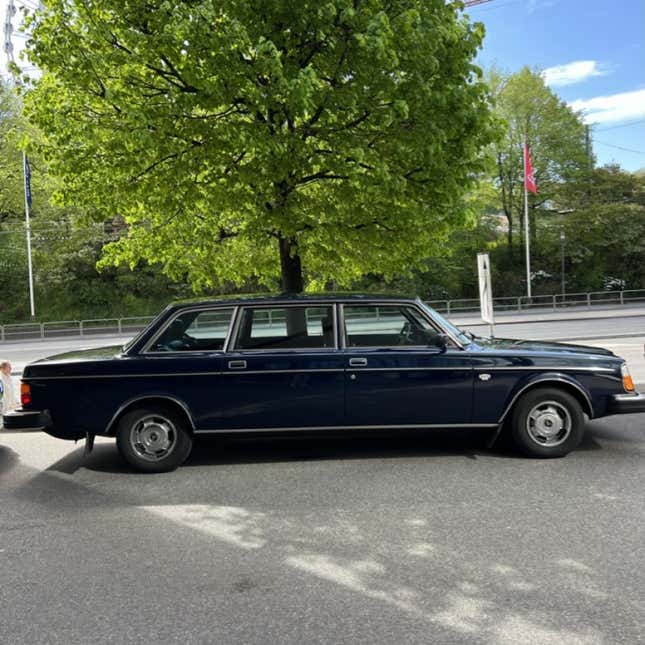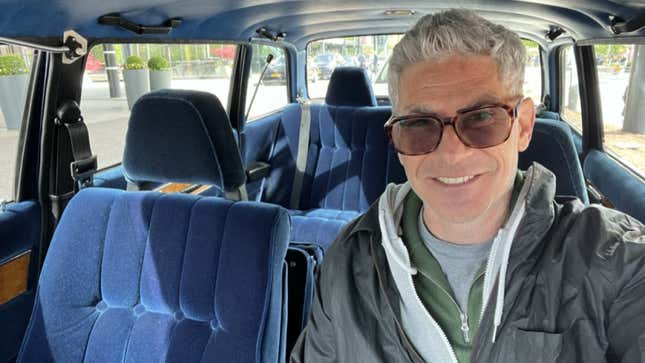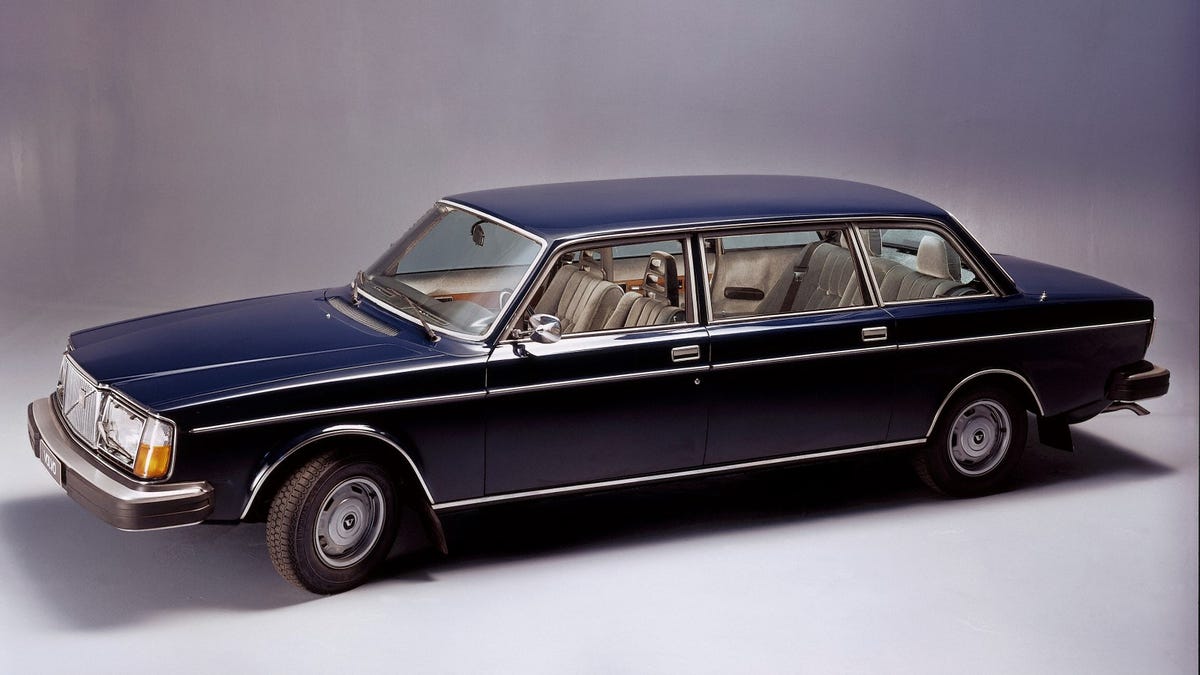Wheezing through the streets of Gothenburg, Sweden, surrounded by a literal sea of cerulean velour, vinyl and polyester, blasting Abba on FM, I felt like the disco era superstar I’d always longed to be. Pedestrians pointed and mouthed OMGs, construction workers ushered me past with grandiose waves and pensioners scratched their balding heads, their muddled brains further addled by a distinct case of does-not-compute.
It wasn’t me, obviously, it was the car: a black sapphire 1979 Volvo 264 TE that may as well have had East German parade flags on its front fenders.
Back in the late 1970s and early 1980s, if you were a high-level East German functionary, and you needed a vehicle befitting your status, you had limited options. The Cold War was roiling, western imports to the Eastern Bloc were forbidden and reviled as decadent, and Russian cars were, well, Soviet. “You couldn’t buy a Cadillac, or a Mercedes-Benz, and you wouldn’t want a Zil,” says Hans Hedberg, a veteran Swedish journalist who now runs Volvo’s heritage activities.
Perpetuating its decades-long performance as an ostensibly neutral country, Sweden maintained economic relations with some countries behind the Iron Curtain, and the GDR was one of them. So when head of state Erich Honecker and his core apparatchik minions needed a vehicle that expressed their exalted status, they came Sverige-ward, to the country’s largest carmaker.

As a template for its executive adaptation, Volvo decided to use the recently-introduced, upscale version of its rectilinear 240 sedan, the 2.7-liter V6-powered 264. Working closely with famed Italian Carrozzeria Bertone, it developed what may have been the least Volvo-esque body style ever: a limousine. Stretched 27” in the rear, reinforced so it wouldn’t twist like a challah when cavalcading around corners, and outfitted with a pair of jump seats that pulled from the front seatbacks, it allegedly became such a popular vehicle with local bureaucrats that the exclusive East Berlin neighborhood in which they lived was known colloquially as Volvograd.
“We only made around 400 total,” Hedberg says. “For 1977 to 1979, they were made by Bertone. Then, after that, from 1980 to 1983, they were built in Sweden, by our sub-supplier, Nilsson.” This company also built stretched versions of the 240 wagon, the 245 T, with an additional row of front-facing seats, but Hedberg doesn’t have one of those in the company’s 270-car collection. “Not yet,” he says.
The 264 TE is, just as you would imagine from sensible and rational Volvo, sensible and rational. Factory-stretched Cadillacs of the same era were ostentatious land yachts, equipped with mammoth seven-liter engines, padded vinyl roofs, opera lamps, wire wheel covers, power-operated doors, leather chauffeur seats, glass dividers between front and rear sections, and multi-speaker eight-track tape players. Mercedes-Benz 600 Pullmans had much of this along with privacy curtains, intercoms, sunroofs, parade horns and rear air conditioners, as well as hydraulically operated windows and trunks that could close with enough force to crush a hand or remove a finger.
In contrast, the 264 TE’s only nod to luxury is a quartet of power window switches, and a span of polished birch on each door panel. The doors lock and unlock manually, the seats adjust in a similar fashion, there is a meek AM/FM cassette radio up front and there is a tachometer, so at least you can watch the overtaxed 140 hp V6 PRV breathe (a joint venture with Peugeot, Renault and Volvo that didn’t really satisfy any of them.)

What I thought was an old-school intercom connecting the front left to rear right seats was actually a pair of map lights on chrome goosenecks, likely to facilitate reading top secret documents before burning them. With this in mind, there is a multitude of ashtrays, of course, and the only vanity mirror I could find was one that folded out from the inside of the glovebox door. Perhaps this was a sidelong nod to philosopher Jean-Jacques Rousseau, who said: “Rather, let us be more simple and less vain.”
I wondered if a timer dial next to the driver’s seat might control some kind of additional rear seat heater for political posteriors during the daunting East German winters, but I should have known better as this was utilitarian as well. “That’s an engine block heater — electric,” Hedberg says.
Even when fully unfolded, the jump seats could not hold an adult human. I crammed myself into one, my knees pressed to my chest and the driver’s seatback, my feet dangling above the blue polyester carpeting. Hedberg giggled as he took a photo, and I wormed my way out. He folded the seatback atop the tiny cushion. The back was padded in matching loomed fur.
“It works better as a footrest,” he says and points to the shiny blue vinyl headliner, which spans the car’s long interior like an inverted David Hockney pool. “It’s subtle. Swedish. Not flashy.”

For those few who necessitated even more luxury, Volvo made just two very special versions. Stretched an additional 20 inches over the limousine — making them about four feet longer than a standard 264 — and equipped with a half-convertible top over a pair of facing leather rear benches. The so-called 264 TE Landaulet was built just for Honecker.
I tease Hedberg that every other good dictator of the era — Idi Amin, The Shah of Iran, Anastasio Somoza, Papa Doc Duvalier, Nicolae Cesusescu — had to make do with a run-of-the-mill 600 Laundaulet. Mercedes made nearly 60 of those, so Volvo’s offering is arguably more rare. I ask Hedberg if he has a 264 TE Landaulet in his collection. He shakes his head, “Nej. Nej.”
He has Kofi Annan’s bulletproof one-off 960 executive, and some bulletproof stretch limos made for Sweden’s monarchy, but he lacks one of Honecker’s half-cab. I offer to try to buy him one on eBay, but I haven’t had much luck. Let me know in the comments if anyone has a lead.







